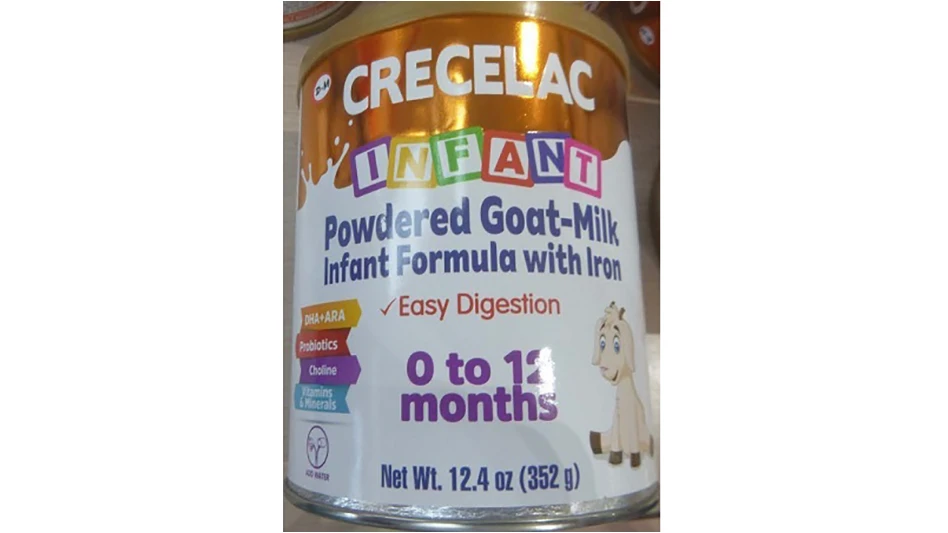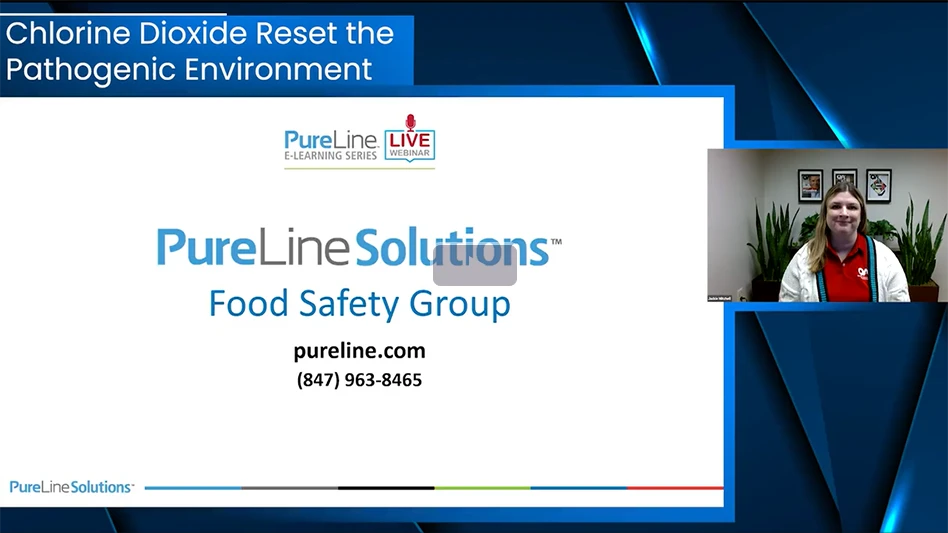
Photo courtesy FDA
The U.S. Food and Drug Administration (FDA) is alerting parents and caregivers about Cronobacter safety concerns with Crecelac Infant Powdered Goat Milk Infant Formula and other infant formula products imported and distributed by Dairy Manufacturers Inc.
Although the company initiated a recall of the products on May 24 because they were not in compliance with all of the FDA’s infant formula regulations, the FDA is now issuing a safety alert due to new findings of Cronobacter contamination in a sample of Crecelac Infant Powdered Goat Milk Infant Formula. As part of its investigation into this matter, on May 29, the FDA found Cronobacter in a sample of Crecelac Infant Powdered Goat Milk Infant Formula collected from a retail store in Texas.
Separately, the FDA is also alerting parents and caregivers to a recall initiated by Dairy Manufacturers Inc. of the products Farmalac Baby Powdered Infant Formula with Iron 0 to 12 months and Farmalac Baby Powdered Infant Formula with Iron Low Lactose 0 to 12 months because of their failure to meet U.S. infant formula regulations. Limited sampling of the Farmalac products did not detect Cronobacter; however, the firm has not submitted the required premarket notification to the FDA to demonstrate the safety and nutritional adequacy of the infant formula. The FDA is continuing to work with the firm and its distributors to ensure the recall is effectively executed.
Cronobacter is a bacterium that can cause bloodstream and central nervous system infections, such as sepsis and meningitis, respectively. Complications from Cronobacter infection in infants can include brain abscess, developmental delays, motor impairments and death.
Symptoms of Cronobacter infection in infants may include poor feeding, irritability, temperature changes, jaundice, grunting breaths or abnormal body movements.
At this time, the FDA said it is not aware of any illnesses associated with these products and does not anticipate any impact on the supply of infant formula based on the recall of these products.
PROBLEM AND SCOPE. The FDA has determined that the infant formula products were sold in the U.S. illegally because, among other things, the company has not submitted to the FDA the required premarket notification.
On May 21, the FDA recommended that the firm recall the infant formula products, to which the firm agreed. As the FDA continued its investigation, the agency identified Cronobacter in a sample of the recalled Crecelac infant formula product. The FDA notified Dairy Manufacturers Inc. of these findings, and the company agreed to update their recall press release to include the laboratory results.
The FDA is continuing to work with the firm and its distributors to ensure the recall is effectively executed.
FURTHER INFORMATION. The FDA is issuing this advisory because infants that consume these products could be at risk of potentially severe infection due to the Cronobacter contamination. The FDA advises parents and caregivers not to feed these infant formula products to infants under their care. If your infant is experiencing symptoms related to Cronobacter infection, such as poor feeding, irritability, temperature changes, jaundice, grunting breaths, or abnormal body movements, contact your health care provider to report their symptoms and receive immediate care.
If caregivers are looking for an alternative goat milk infant formula for sale in the U.S., they may wish to speak with their infant's health care provider, as there are goat milk infant formulas that either have completed the required FDA premarket notification process or are currently being marketed under the FDA’s enforcement discretion policy.
Parents and caregivers can find more information on safe infant feeding practices on the FDA’s infant formula landing page.
Latest from Quality Assurance & Food Safety
- Kim Heiman Elected to Second Term as President of Wisconsin Cheese Makers Association
- FAO Launches $150 Million Plan to Restore Ukrainian Agricultural Production
- Pet Food Company Implements Weavix Radio System for Manufacturing Communication
- Penn State Offers Short Course on Food Safety and Sanitation for Manufacturers
- USDA Announces New Presidential Appointments
- FDA to Phase Out Petroleum-Based Synthetic Dyes in Food
- IFT DC Section to Host Food Policy Event Featuring FDA, USDA Leaders
- CSQ Invites Public Comments on Improved Cannabis Safety, Quality Standards





